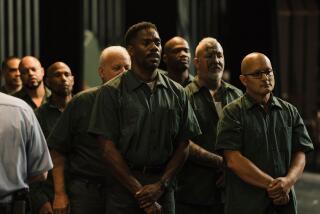MOVIE REVIEW : ‘SIGNAL 7’: AN INTIMATE TRIP IN NIGHT
Rob Nilsson’s “Signal 7” (Beverly Center Cineplex) takes us on a dusk-to-dawn ride into the lives and souls of two aging San Francisco cabbies. It’s a stripped-down, painful trip, and by the time dawn approaches and one of them is ready for sleep, Nilsson and his cast have brought us close enough to see sweat and tears running down the skin.
The two drivers, Speed (Bill Ackridge) and Marty (Dan Leegant), are 50-ish men who work as part-time stage actors. Both were recently involved in a union-organizing vote; and both knew another cabbie, shot to death that evening (a Signal 7 is the general alert when a driver may be in trouble). Predictably, the death casts a shadow, turns them inward.
Marty and Speed have never really settled into life, and when they kid around, they affect the mock-tough profanity and cynicism of young guys bluffing it out. They plan trips to Los Angeles, brag about sexual conquests (most of which never happened) and, warily, they brood about the past and life closing in on them.
It’s ironic that they’re would-be actors--because though the characters aren’t talented at theater (Marty, an ex-pro, is skilled but Speed is hopeless), Ackridge and Leegant themselves are superb. Each gets some scenes of stunning power and empathy. There’s a further irony: In the movie, when they try out for Clifford Odets’ “Waiting for Lefty,” they’re too tricky, flat or florid. They aren’t considered “right casting” for characters close to their counterparts.
These cabbies remind you less of Robert De Niro’s Travis Bickel or the raffish crew on “Taxi” than they do of Odets’ people--or Arthur Miller’s, or Eugene O’Neill’s. And, most of all, of John Cassavetes’. Nilsson dedicates “Signal to Cassavetes, and the spirit of “Faces,” “Shadows” and “Husbands” hovers over the film. It has the same raw spontaneity, the coarsely vivid close-ups and macho jocularity, veined with pain. Though Cassavetes is often a careful scripter, it’s sometimes felt that he and his actors create it all in rehearsal (a tribute to his uncanny brilliance as an actors’ director). And that’s exactly the method of “Signal 7”: Nilsson gives himself a story credit, but the script credit goes to the cast en masse.
There are problems with “Signal 7”--but, given the budget, you can understand and excuse them. The slowly unpeeling all-night structure is overly familiar (for plays, if not for movies). And it seems a bit off here--the shadow of death arrives too early and tends to deflate what follows. The political elements, the labor discussions, seem gratuitous (you almost get the idea that the absence of the union, for Nilsson, corresponds to the absence of God for Albee or Williams). Some scenes do seem like actors’ exercises, and the best ones are spread out: the opening poker game, the climax, and the “Waiting for Lefty” tryout (where Bob Elross, as the director, radiates a wonderful threadbare Stanislavskian eloquence).
Still, it’s an honorable film--especially when you compare it to the current studio product. A script fashioned this way--improvised by an “unknown” cast and shot on a four-night schedule--shouldn’t sound this much better than its expensive competitors, have so much more truth, tightness and intensity. There’s a lesson here: economy and dedication. Within its limits, “Signal 7” (Times-rated: Mature, for language) casts a steady beam on the night city’s underside--seemingly pitiless, but finally compassionate.
More to Read
Only good movies
Get the Indie Focus newsletter, Mark Olsen's weekly guide to the world of cinema.
You may occasionally receive promotional content from the Los Angeles Times.







